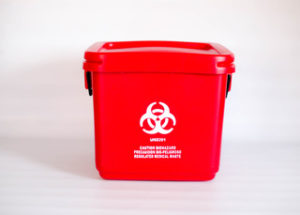Structured Solutions: Simplifying Medical Care Procedures with Professional Medical Waste Disposal
Structured Solutions: Simplifying Medical Care Procedures with Professional Medical Waste Disposal
Blog Article
The Significance of Appropriate Garbage Disposal Practices
From the repercussions of inappropriate waste disposal on our environment to the long-lasting ramifications for future generations, the value of adopting lasting waste monitoring methods can not be overstated. By discovering the ecological impact of careless waste disposal, the benefits of recycling campaigns, and the importance of neighborhood interaction in waste decrease efforts, a deeper understanding of why correct waste disposal methods are vital emerges.
Ecological Influence of Improper Disposal
Incorrect disposal of waste presents a significant risk to the atmosphere due to its destructive effects on environments and human health and wellness. When waste is not appropriately handled, it can result in contamination of the dirt, air, and water, causing harm to various plant and animal types. click here. Chemicals and toxic substances from improperly disposed waste can permeate into the ground, infecting groundwater sources and impacting the health of both wildlife and people
Furthermore, the build-up of waste in garbage dumps produces greenhouse gases like methane, adding to climate adjustment and international warming. Inappropriate disposal methods likewise lead to littering, which not only degrades the aesthetic value of the setting however can likewise damage wildlife with ingestion or complexity.
To reduce these environmental impacts, it is vital for areas and people to adopt appropriate garbage disposal techniques such as recycling, composting, and liable contaminated materials disposal. By taking these steps, we can aid secure ecological communities, maintain natural deposits, and guard human health and wellness for existing and future generations.
Advantages of Recycling Programs
Consistently joining reusing programs supplies many benefits for both the setting and culture in its entirety. Among the essential benefits of recycling is the conservation of natural deposits. By reusing materials such as paper, plastic, glass, and metal, less basic materials require to be removed from the planet, causing decreased deforestation, mining, and exploration tasks. This preservation of sources not only helps in preserving environmental equilibrium but additionally adds to sustainable advancement.
Additionally, recycling plays a critical role in lowering energy consumption and greenhouse gas discharges. The manufacturing of products from recycled materials usually requires less energy contrasted to making from virgin resources - medical waste removal. Because of this, the carbon footprint connected with the production procedure is substantially reduced, helping in the fight against climate modification
In addition, reusing programs produce work possibilities in the reusing sector, promoting financial growth and social well-being. By encouraging the recycling and reuse of materials, these programs support a circular economy that reduces waste generation and makes the most of source performance, eventually resulting in a cleaner, greener future for generations to find.
Hazardous Waste Monitoring Standards
Executing effective harmful waste administration standards is vital for decreasing ecological and wellness dangers connected with the improper disposal of hazardous materials - click here. Appropriate handling, therapy, and disposal of contaminated materials are necessary to protect against contamination of dirt, water resources, and air
One trick standard is appropriate labeling of unsafe waste containers to make certain secure handling and transportation. In addition, facilities must comply with rigorous storage needs to avoid leakages, spills, or mishaps that could endanger human wellness and the atmosphere. Routine training programs for workers on contaminated materials administration methods are likewise crucial to guarantee compliance with guidelines and promote a culture of safety.
Additionally, contaminated materials ought to be set apart based upon its homes to stop chemical responses that could lead to hazardous situations. Implementing a thorough waste tracking system can assist check the activity of dangerous materials from generation to disposal, making sure openness and liability. By following these standards faithfully, sectors and services can add to a much safer and cleaner atmosphere for future and existing generations.
Community Participation in Waste Decrease
To properly attend to the ecological and health and wellness threats related to harmful waste management, engaging the community in waste decrease campaigns is critical. Community participation plays a critical function in promoting sustainable waste monitoring techniques and fostering a culture of environmental duty. By informing homeowners regarding proper waste segregation, reusing, and composting strategies, areas can significantly lower the amount of waste sent to landfills, consequently reducing ecological contamination and preserving natural deposits.
Community engagement in waste reduction programs likewise helps in elevating recognition about the value of waste minimization and encourages people to embrace eco-friendly habits in their every day lives - medical waste disposal. Collaborative initiatives in between regional authorities, waste management firms, and community members can lead to the implementation of efficient waste decrease strategies customized to the specific needs of each neighborhood or town
In addition, neighborhood engagement promotes a feeling of possession and liability among residents, equipping them to take aggressive actions towards minimizing waste generation and advertising a cleaner, healthier atmosphere for future and present generations. By interacting towards usual waste decrease goals, communities can make a substantial effect on reducing the unfavorable results of improper waste disposal methods.

Future of Sustainable Waste Practices
Conventional waste disposal methods, such as landfilling and incineration, are no longer sustainable in the lengthy term due to their significant environmental effects. Moving forward, the future of lasting waste methods exists in accepting a round economy strategy, where sources are recycled, recycled, or repurposed to minimize waste generation.
Technological innovations play a vital function in shaping the future of sustainable waste methods. Advanced waste sorting and recycling innovations can help enhance the performance of waste administration procedures, enabling for the recuperation of beneficial sources from waste streams. Furthermore, the adoption of naturally degradable materials and composting methods can aid decrease the amount of organic waste finishing up in land fills, thereby mitigating greenhouse gas discharges.
Furthermore, promoting consumer recognition and education and learning on correct waste segregation and disposal methods is crucial for driving behavior adjustment towards sustainability. By promoting a society of waste recycling, reuse, and decrease, areas can jointly add to a cleaner and healthier atmosphere for future generations.

Conclusion
In verdict, appropriate waste disposal methods are important for minimizing ecological impact and promoting sustainability. By applying reusing programs, handling hazardous waste effectively, and encouraging neighborhood involvement in waste decrease efforts, we can work towards a cleaner and much healthier environment. It is essential for governments, businesses, and people to focus on sustainable waste techniques for the future well-being of our earth.
.jpg)
From the effects of incorrect waste disposal on our setting to the long-term ramifications for future generations, the importance of taking on sustainable waste management methods can not be overemphasized. By go to the website checking out the ecological effect of untrustworthy waste disposal, the benefits of recycling campaigns, and the importance of community interaction in waste decrease initiatives, a deeper understanding of why proper waste disposal practices are vital emerges.
By enlightening residents concerning appropriate waste partition, reusing, and composting strategies, communities can significantly reduce the quantity of waste sent to garbage dumps, thereby minimizing ecological pollution and conserving natural sources. (click here)
Relocating forward, the future of lasting waste methods exists in embracing a circular economic climate method, where resources are reused, recycled, or repurposed to decrease waste generation.
Advanced waste sorting and recycling innovations can help boost the effectiveness of waste management procedures, enabling for the healing of useful sources from waste streams.
Report this page